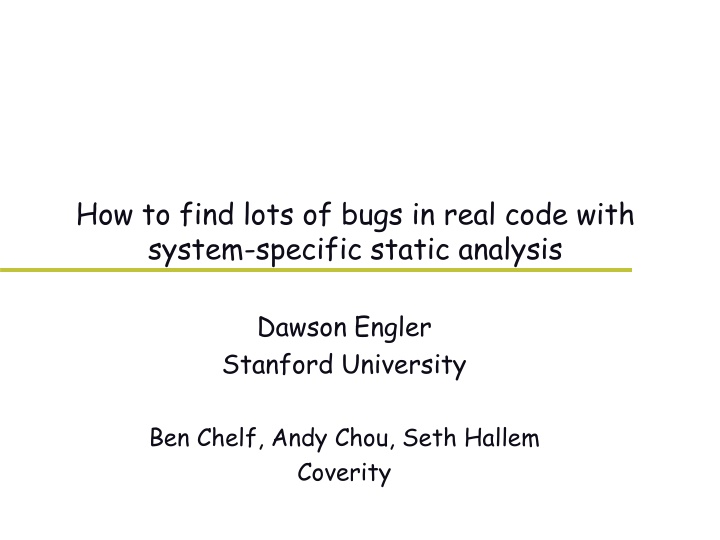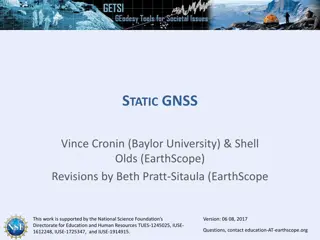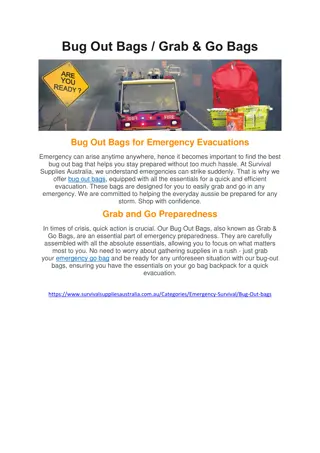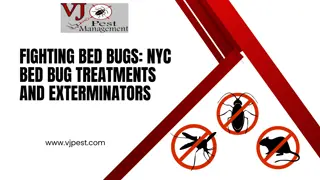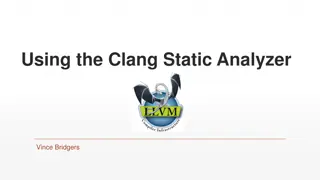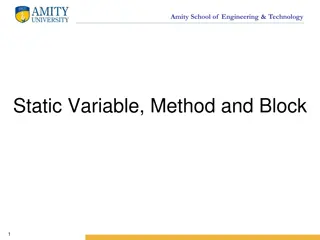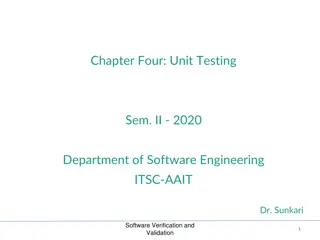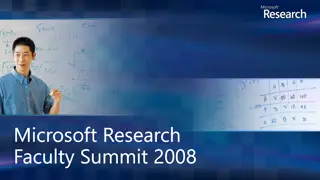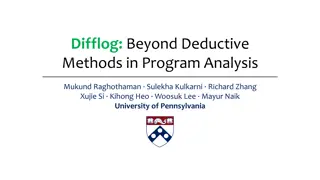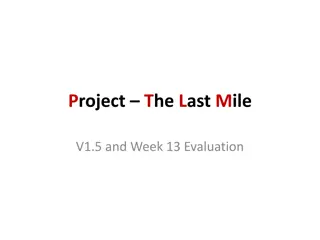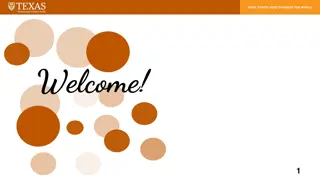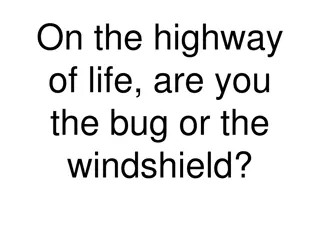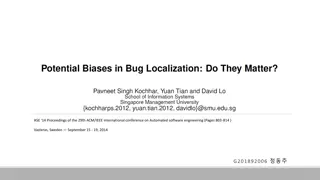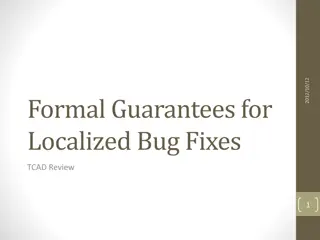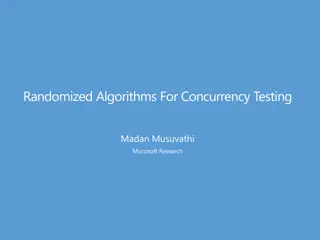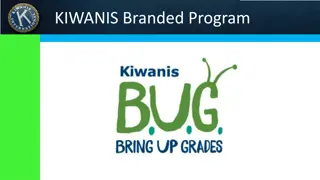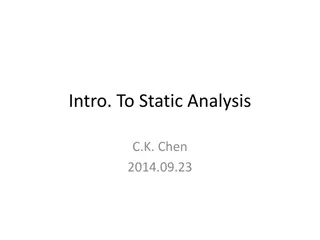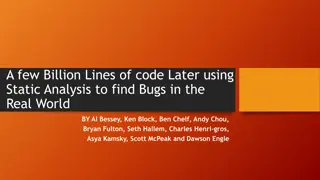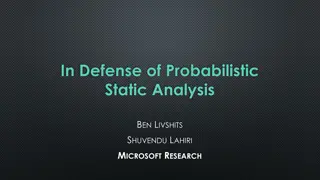System-Specific Static Analysis for Bug Finding in Real Code
Explore the methodology of system-specific static analysis as a powerful tool for detecting bugs in real code. This approach involves implementing extensions dynamically linked into the compiler, enabling the identification of errors across intricate program structures without the need for actual execution. Through examples and detailed explanations, understand how this analysis technique enhances bug detection in complex systems software.
Download Presentation

Please find below an Image/Link to download the presentation.
The content on the website is provided AS IS for your information and personal use only. It may not be sold, licensed, or shared on other websites without obtaining consent from the author.If you encounter any issues during the download, it is possible that the publisher has removed the file from their server.
You are allowed to download the files provided on this website for personal or commercial use, subject to the condition that they are used lawfully. All files are the property of their respective owners.
The content on the website is provided AS IS for your information and personal use only. It may not be sold, licensed, or shared on other websites without obtaining consent from the author.
E N D
Presentation Transcript
How to find lots of bugs in real code with system-specific static analysis Dawson Engler Stanford University Ben Chelf, Andy Chou, Seth Hallem Coverity
The core static bug finding intuition Systems software has many ad-hoc restrictions: acquire lock L before accessing shared variable X disabled interrupts must be re-enabled Error = crashed system. How to find? Observation: rules can be checked with a compiler scan source for relevant acts, check that correct. E.g., to check disabled interrupts must be re-enabled: scan for calls to disable()/enable(), check matching, not done twice Main problem: compiler has machinery to check, but not knowledge implementor has knowledge but not machinery System-specific static analysis: give implementors a framework to add easily-written, system- specific compiler extensions
System-specific static analysis Implementation: Extensions dynamically linked into EDG C compiler Applied down all paths ( flow sensitive ), across all procedures ( interprocedural ) in input program source at compile time. save(flags); cli(); if(!(buf = kmalloc())) return 0; restore(flags); return buf; EDG compiler Linux drivers/ raid5.c did not re- enable ints! int checker Scalable: handles millions of lines of code Precise: says exactly what error was Immediate: finds bugs without having to execute path Effective: 1000s of bugs in Linux, OpenBSD, Commercial
A bit more detail initial { #include linux-includes.h } sm chk_interrupts { decl { unsigned } flags; // named patterns pat enable = { sti(); } | { restore_flags(flags); }; pat disable = { cli(); }; Is enabled enable disable enable Is disabled // states is_enabled: disable ==> is_disabled | enable ==> { err("double enable"); } ; is_disabled: enable ==> is_enabled | disable ==> { err("double disable"); } | $end_of_path$ ==> { err("exiting w/intr disabled!"); } ; } disable End-of- path error
No X after Y: do not use freed memory sm free_checker { state decl any_pointer v; decl any_pointer x; start: { kfree(v); } ==> v.freed ; v.freed: { v != x } || { v == x } ==> { /* do nothing */ } | { v } ==> { err( Use after free! ); } ; } ent->data = kmalloc( ) if(!ent->data) { kfree(ent); goto out; out: return ent; start kfree(v) v.freed use(v) /* 2.4.1: fs/proc/generic.c */ error
In context Y, dont do X: blocking Linux: if interrupts are disabled, or spin lock held, do not call an operation that could block: Compute transitive closure of all potentially blocking fn s Hit disable/lock: warn of any calls 123 errors, 8 false pos clean lock(l) unlock(l) enable() disable() NoBlock /* drivers/net/pcmcia/wavelan_cs.c */ spin_lock_irqsave (&lp->lock, flags);/* 1889 */ switch(cmd) ... case SIOCGIWPRIV: /* 2304 */ if(copy_to_user(wrq->u.data.pointer, )) Block call error Heavy clustering: net/atm: 152 checks, 22 bugs (exp 1.9) P =3.1x10^-15 drivers/i2o: 692 checks, 35 bugs (exp 8.8) P= 2.6x10^-10
X before Y: sanitize integers before use Security: OS must check user integers before use Checker: Warn when unchecked integers from untrusted sources reach trusting sinks Syscall param Network packet copyin(&v, p, len) v.clean v.tainted Use(v) memcpy(p, q, v) copyin(p,q,v) copyout(p,q,v) array[v] while(i < v) ERROR Global; simple to retarget (text file with 2 srcs&12 sinks) Linux: 125 errors, 24 false; BSD: 12 errors, 4 false
Some big, gaping security holes. Remote exploit, no checks /* 2.4.9/drivers/isdn/act2000/capi.c:actcapi_dispatch */ isdn_ctrl cmd; ... while ((skb = skb_dequeue(&card->rcvq))) { msg = skb->data; ... memcpy(cmd.parm.setup.phone,msg->msg.connect_ind.addr.num, msg->msg.connect_ind.addr.len - 1); Missed lower-bound check: /* 2.4.5/drivers/char/drm/i810_dma.c */ if(copy_from_user(&d, arg, sizeof(arg))) return EFAULT; if(d.idx > dma->buf_count) return EINVAL; buf = dma->buflist[d.idx]; Copy_from_user(buf_priv->virtual, d.address, d.used);
Enforcing subtle rules Unexpected overflow copy_from_user(&wrthdr, addr, sizeof wrthdr); if ( wrthdr.size + wrthdr.offset > FST_MEMSIZE ) return -ENXIO; copy_from_user(card->mem+wrthdr.offset,data,wrthdr.size) /* 2.4.9-ac7/fs/intermezzo/psdev.c */ error = copy_from_user(&input, arg, sizeof(input)); input.path = kmalloc(input.path_len + 1, GFP_KERNEL); if ( !input.path ) return -ENOMEM; error =copy_from_user(input.path,user_path, input.path_len); Weird security implications get_user(len, oldlenp); /* 2.4.1/kernel/sysctl.c */ if (len > table->maxlen) len = table->maxlen; copy_to_user(oldval, table->data, len);
Results for BSD 2.8 & 4 months of Linux All bugs released to implementors; most serious fixed Linux BSD Violation Bug Fixed Bug Fixed Gain control of system Corrupt memory 43 17 2 2 Read arbitrary memory 19 14 7 7 Denial of service 17 5 0 0 Minor 28 1 0 0 Total 125 52 12 12 18 15 3 3 Local bugs 109 12 Global bugs 16 0 Bugs from inferred ints 12 0 False positives 24 4 Number of checks ~3500 594
Talk Overview System-specific static analysis: Correctness rules map clearly to concrete source actions Check by making compilers aggressively system-specific Easy: digest sentence fragment, write checker. One person writes checker, imposed on all code. Result: precise, immediate error diagnosis. Found errors in every system looked at Next: Belief analysis Using programmer beliefs to infer state of system, relevant rules Key: Find bugs without knowing truth.
Goal: find as many serious bugs as possible Problem: what are the rules?!?! 100-1000s of rules in 100-1000s of subsystems. To check, must answer: Must a() follow b()? Can foo() fail? Does bar(p) free p? Does lock l protect x? Manually finding rules is hard. So don t. Instead infer what code believes, cross check for contradiction Intuition: how to find errors without knowing truth? Contradiction. To find lies: cross-examine. Any contradiction is an error. Deviance. To infer correct behavior: if 1 person does X, might be right or a coincidence. If 1000s do X and 1 does Y, probably an error. Crucial: we know contradiction is an error without knowing the correct belief!
Cross-checking program belief systems MUST beliefs: Inferred from acts that imply beliefs code *must* have. x = *p / z; // MUST belief: p not null // MUST: z != 0 unlock(l); // MUST: l acquired x++; // MUST: x not protected by l Check using internal consistency: infer beliefs at different locations, then cross-check for contradiction MAY beliefs: could be coincidental Inferred from acts that imply beliefs code *may* have A(); B(); B(); B(); B(); A(); A(); A(); B(); // MUST: B() need not // be preceded by A() // MAY: A() and B() // must be paired Check as MUST beliefs; rank errors by belief confidence.
Trivial consistency: NULL pointers *p implies MUST belief: p is not null A check (p == NULL) implies two MUST beliefs: POST: p is null on true path, not null on false path PRE: p was unknown before check Cross-check these for three different error types. Check-then-use (79 errors, 26 false pos) /* 2.4.1: drivers/isdn/svmb1/capidrv.c */ if(!card) printk(KERN_ERR, capidrv-%d: , card->contrnr )
Null pointer fun Use-then-check: 102 bugs, 4 false /* 2.4.7: drivers/char/mxser.c */ struct mxser_struct *info = tty->driver_data; unsigned flags; if(!tty || !info->xmit_buf) return 0; Contradiction/redundant checks (24 bugs, 10 false) /* 2.4.7/drivers/video/tdfxfb.c */ fb_info.regbase_virt = ioremap_nocache(...); if(!fb_info.regbase_virt) return -ENXIO; fb_info.bufbase_virt = ioremap_nocache(...); if(!fb_info.regbase_virt) { iounmap(fb_info.regbase_virt);
Internal Consistency: finding security holes Applications are bad: Rule: do not dereference user pointer <p> One violation = security hole Detect with static analysis if we knew which were bad Big Problem: which are the user pointers??? Sol n: forall pointers, cross-check two OS beliefs *p implies safe kernel pointer copyin(p)/copyout(p) implies dangerous user pointer Error: pointer p has both beliefs. Implemented as a two pass global checker Result: 24 security bugs in Linux, 18 in OpenBSD (about 1 bug to 1 false positive)
An example Still alive in linux 2.4.4: /* drivers/net/appletalk/ipddp.c:ipddp_ioctl */ case SIOCADDIPDDPRT: return ipddp_create(rt); case SIOCDELIPDDPRT: return ipddp_delete(rt); case SIOFCINDIPDDPRT: if(copy_to_user(rt, ipddp_find_route(rt), sizeof(struct ipddp_route))) return EFAULT; Tainting marks rt as a tainted pointer, checker warns that rt is passed to a routine that dereferences it 2 other examples in same routine
Cross checking beliefs related abstractly Common: multiple implementations of same interface. Beliefs of one implementation can be checked against those of the others! User pointer (3 errors): If one implementation taints its argument, all others must foo_write(void *p, void *arg, ){ copy_from_user(p, arg, 4); disable(); do something enable(); return 0; } bar_write(void *p, void *arg, ){ *p = *(int *)arg; do something disable(); return 0; } How to tell? Routines assigned to same function pointer write_fp = foo_write; write_fp = bar_write;
MAY beliefs Separate fact from coincidence? General approach: Assume MAY beliefs are MUST beliefs. Check them Count number of times belief passed check (S=success) Count number of times belief failed check (F=fail) Expect: valid beliefs = high ratio of S to F. Use S and F to compute confidence that belief is valid. Rank errors based on this confidence. Go down list, inspecting until false positives are too high. How to weigh evidence?
How to weigh MAY beliefs Wrong way: percentage. (Ignores population size) Success=1, Failure=0, Percentage = 1/1 * 100= 100% Success=999, Failure=10,Percentage =999/1000 = 99.9% A better way: hypothesis testing. Treat each check as independent binary coin toss Pick probability p0 that coin coincidently comes up S. For a given belief, compute how unlikely that it coincidently got S successes out of N (N=S+F) attempts Z = (observed expected) / stderr = (S N*p0) / sqrt(N*p0*(1-p0)) HUGE mistake: pick T, where Z>T implies MUST Becomes very sensitive to T.
Statistical: Deriving deallocation routines Use-after free errors are horrible. Problem: lots of undocumented sub-system free functions Soln: derive behaviorally: pointer p not used after call foo(p) implies MAY belief that foo is a free function Conceptually: Assume all functions free all arguments (in reality: filter functions that have suggestive names) Emit a check message at every call site. Emit an error message at every use foo(p); *p = x; *p = x; *p = x; foo(p); foo(p); bar(p); p = 0; bar(p); p = 0; bar(p); *p = x; Rank errors using z test statistic: z(checks, errors) E.g., foo.z(3, 3) < bar.z(3, 1) so rank bar s error first Results: 23 free errors, 11 false positives
Ranked free errors kfree[0]: 2623 checks, 60 errors, z= 48.87 2.4.1/drivers/sound/sound_core.c:sound_insert_unit: ERROR:171:178: Use-after-free of 's'! set by 'kfree ... kfree_skb[0]: 1070 checks, 13 errors, z = 31.92 2.4.1/drivers/net/wan/comx-proto-fr.c:fr_xmit: ERROR:508:510: Use-after-free of 'skb'! set by 'kfree_skb ... [FALSE] page_cache_release[0] ex=117, counter=3, z = 10.3 dev_kfree_skb[0]: 109 checks, 4 errors, z=9.67 2.4.1/drivers/atm/iphase.c:rx_dle_intr: ERROR:1321:1323: Use-after-free of 'skb'! set by 'dev_kfree_skb_any ... cmd_free[1]: 18 checks, 1 error, z=3.77 2.4.1/drivers/block/cciss.c:667:cciss_ioctl: ERROR:663:667: Use-after-free of 'c'! set by 'cmd_free[1]' drm_free_buffer[1] 15 checks, 1 error, z = 3.35 2.4.1/drivers/char/drm/gamma_dma.c:gamma_dma_send_buffers: ERROR:Use-after-free of 'last_buf'! [FALSE] cmd_free[0] 18 checks, 2 errors, z = 3.2
Recall: deterministic free checker sm free_checker { state decl any_pointer v; decl any_pointer x; start: { kfree(v); } ==> v.freed ; v.freed: { v != x } || { v == x } ==> { /* do nothing */ } | { v } ==> { err( Use after free! ); } ; }
A statistical free checker sm free_checker local { state decl any_pointer v; decl any_fn_call call; decl any_pointer x; start: { call(v) } ==> v.freed, { v.data = call.name(); printf( checking [POP=%s] , v.data); } ; v.freed: { v != x } || { v == x } ==> { /* do nothing */ } | { v } ==> { err( Use after free! [FAIL=%s] , v.data); } ; }
A bad free error /* drivers/block/cciss.c:cciss_ioctl */ if (iocommand.Direction == XFER_WRITE){ if (copy_to_user(...)) { cmd_free(NULL, c); if (buff != NULL) kfree(buff); return( -EFAULT); } } if (iocommand.Direction == XFER_READ) { if (copy_to_user(...)) { cmd_free(NULL, c); kfree(buff); } } cmd_free(NULL, c); if (buff != NULL) kfree(buff);
Deriving A() must be followed by B() a(); b(); implies MAY belief that a() follows b() Programmer may believe a-b paired, or might be a coincidence. Algorithm: Assume every a-b is a valid pair (reality: prefilter functions that seem to be plausibly paired) Emit success for each path that has a() then b() Emit error for each path that has a() and no b() foo(p, ) bar(p, ); foo-bar y(); foo(p, ); check x(); check x-y error:foo, no bar! Rank errors for each pair using the test statistic z(foo.success, foo.error) = z(2, 1) Results: 23 errors, 11 false positives.
Checking derived lock functions Evilest: trident_release: lock_kernel(); card = state->card; dmabuf = &state->dmabuf; VALIDATE_STATE(state); /* 2.4.1: drivers/sound/trident.c: And the award for best effort: /* 2.4.0:drivers/sound/cmpci.c:cm_midi_release: */ lock_kernel(); if (file->f_mode & FMODE_WRITE) { add_wait_queue(&s->midi.owait, &wait); ... if (file->f_flags & O_NONBLOCK) { remove_wait_queue(&s->midi.owait, &wait); set_current_state(TASK_RUNNING); return EBUSY; unlock_kernel();
Statistical: deriving routines that can fail Traditional: Use global analysis to track which routines return NULL Problem: false positives when pre-conditions hold, difficult to tell statically ( return p->next ?) Instead: see how often programmer checks. Rank errors based on number of checks to non-checks. Algorithm: Assume *all* functions can return NULL If pointer checked before use, emit check message If pointer used before check, emit error P = foo( ); *p = x; If(!p) return; *p = x; *p = x; p = bar( ); p = bar( ); If(!p) return; p = bar( ); If(!p) return; *p = x; p = bar( ); *p = x; Sort errors based on ratio of checks to errors Result: 152 bugs, 16 false.
The worst bug Starts with weird way of checking failure: /* 2.3.99: ipc/shm.c:1745:map_zero_setup */ if (IS_ERR(shp = seg_alloc(...))) return PTR_ERR(shp); static inline long IS_ERR(const void *ptr) { return (unsigned long)ptr > (unsigned long)-1000L; } So why are we looking for seg_alloc ? /* ipc/shm.c:750:newseg: */ if (!(shp = seg_alloc(...)) return -ENOMEM; id = shm_addid(shp); int ipc_addid( * new ) { ... new->cuid = new->uid = ; new->gid = new->cgid = ids->entries[id].p = new;
Summary Effective static analysis of real code Write small extension, apply to code, find 100s-1000s of bugs in real systems Result: Static, precise, immediate error diagnosis One person writes, imposes on all code. Belief analysis: broader checking Using programmer beliefs to infer state of system, relevant rules Key feature: find errors without knowing truth Found lots of serious bugs everywhere.
Assertion: Soundness is often a distraction Soundness: Find all bugs of type X. Not a bad thing. More bugs good. BUT: can only do if you check weak properties. What soundness really wants to be when it grows up: Total correctness: Find all bugs. Most direct approximation: find as many bugs as possible. Opportunity cost: Diminishing returns: Initial analysis finds most bugs Spend time on what gets the next biggest set of bugs Easy experiment: bug counts for sound vs unsound tools. Soundness violates end-to-end argument: It generally does not make much sense to reduce the residual error rate of one system component (property) much below that of the others.
Static vs dynamic bug finding Static: precondition = compile (some) code. All paths + don t need to run + easy diagnosis. Low incremental cost per line of code Can get results in an afternoon. 10-100x more bugs. Dynamic: precondition = compile all code + run What does code do? How to build? How to run? Runs code, so can check implications. Good: Static detects ways to cause error, dynamic can check for the error itself. Result: Static better at checking properties visible in source, dynamic better at properties implied by source.
Open Q: how to get the bugs that matter? Myth: all bugs matter and all will be fixed *FALSE* Find 10 bugs, all get fixed. Find 10,000 Reality All sites have many open bugs (observed by us & PREfix) Myth lives because state-of-art is so bad at bug finding What users really want: The 5-10 that really matter General belief: bugs follow 90/10 distribution Out of 1000, 100 (10? or 1?) account for most pain. Fixing 900+ waste of resources & may make things worse How to find worst? No one has a good answer to this. Possibilities: promote bugs on executed paths or in code people care about,
Open Q: Do static tools really help? Bugs found Bad behavior Bad behavior Bugs found The null hypothesis The optimistic hope Bad behavior Bugs found An Ugly Possibility Danger: Opportunity cost. Danger: Deterministic canary bugs to non-deterministic.
Laws of static bug finding Vacuous tautologies that imply trouble Can t find code, can t check. Can t compile code, can t check. A nice, balancing empirical tautology If can find code AND checked system is big AND can compile (enough) of it THEN: will *always* find serious errors. A nice special case: Check rule never checked? Always find bugs. Otherwise immediate kneejerk: what wrong with checker???
